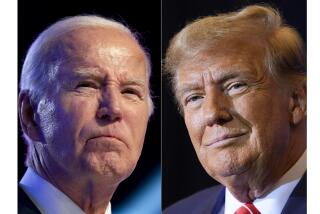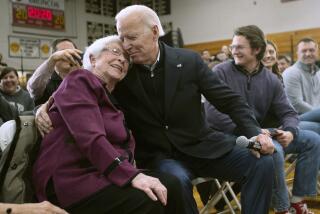Rough Times Lie Ahead for Buchanan
- Share via
MANCHESTER, N.H. — Buoyant and loose, Republican presidential candidate Patrick J. Buchanan as much as acknowledged Wednesday that New Hampshire voters had just dumped a host of thorny problems into his lap.
Buchanan carried 37% of the vote in Tuesday’s Republican primary to President Bush’s 53%, and the unexpectedly strong showing vaulted his candidacy into the realm of possibility, even if it remains a distant one.
But just hours into his celebration, Buchanan was left squinting under a far harsher spotlight than had brightened his way when he was considered a mere protest candidate.
The metamorphosis was apparent early Wednesday as reporters pressed him with renewed vigor on his lack of military service, his financial holdings and his controversial comments. One asked him to respond to reports that he was anti-black, anti-Semitic and homophobic.
“Individually or collectively?” he joked, before settling down to dismiss the accusations as “smear charges.”
As Buchanan and his advisers acknowledged, rough times lie ahead. Not only is Buchanan likely to be held to a much higher standard by voters, he also must struggle to wrench his skeletal campaign organization into shape for the multi-state marathon of the next few weeks.
The former television commentator signaled the precariousness of his position by pleading with Republicans to “start climbing down off the fence” by “standing up and being counted the way the people of New Hampshire have stood up.”
“Somewhere we’ve got to beat the President in a primary, and then this firestorm we talked about has got to ignite,” he said.
“There is no doubt about it, we are going to need help,” he added. “We’re going to need help in those primary states that we haven’t even visited yet. And that’s most of them.”
By Buchanan’s own words, the second phase of the campaign, the upcoming Southern primaries, represents a “daunting” hurdle. Within three weeks, ballots will be cast in 12 states, including the expensive campaign states of Florida and Texas on Super Tuesday, March 10.
For voters outside New Hampshire, it will be the first opportunity to get to know Buchanan beyond the feisty persona he developed on television shows.
Already on Wednesday, Bush, who refused even to say Buchanan’s name during the 10-week campaign for New Hampshire, showed that he will try to define his challenger for those voters. Besides calling him by name, Bush cited an old syndicated column written by Buchanan to suggest that his opponent favors junking the current Social Security system.
“Good heavens, I don’t know what I wrote 27 years ago,” Buchanan retorted.
As the race progresses, the opinionated Buchanan can expect to come under more fire, and he has left a broad record for the opposition to criticize.
Renowned conservative William F. Buckley Jr. recently took Buchanan to task for comments Buckley described as anti-Semitic. In the past, Buchanan has questioned the assertions of Jews that thousands were killed in World War II’s Treblinka death camp.
He also has referred to Congress as “Israeli-occupied territory” and specifically singled out four Jewish-Americans as “beating the drums” for war in the Persian Gulf.
He has publicly suggested that immigration policies be tailored to ethnicity. “Englishmen” rather than “Zulus” should be allowed in, he said, because they would cause “less problems for the people of Virginia.”
In a January interview with the Los Angeles Times, he lamented what he called an “assault upon what they call Western culture” and criticized Latinos who he said were “coming across (the border) to get the benefits of the welfare state.”
Buchanan said Wednesday that voters would not be put off by his statements.
“This is a real world,” he said. “This is where people lose homes, they lose jobs, they lose a way of life. . . . They are in desperate straits, and some demonstrator running around and saying Pat Buchanan said something in a memo 25 years ago doesn’t impress them because they have to deal with reality.”
Unlike the other major party candidates for President, Buchanan has yet to release his financial records. They are expected to show that Buchanan, who has based his campaign on a strong defense of the middle class, is a very wealthy man because of his media career.
“Pat’s going to be examined in ways he didn’t think he was going to be examined,” conservative political consultant David Keene said.
In the South, the examination is likely to include probing of Buchanan’s opposition to the Gulf War, which remains a popular effort. Buchanan himself on Wednesday described Bush’s wartime leadership as “brilliant.”
“I did not think the emir (of Kuwait) was worth a single Marine,” he said in defending his opposition. “I will stand on what I said and do believe.”
The draft issue has yet to be raised by Buchanan’s opponent, but his lack of military service will contrast sharply in the South with Bush, a World War II Navy pilot who was shot down by the Japanese in combat. Buchanan joined an Army Reserve Officer Training Corps program while in college, but was ultimately dismissed from the draft because of a knee injury.
Besides defining himself for voters, Buchanan faces equally pressing structural problems as he presses on.
In leaving New Hampshire behind, he shifts from running in a state where it was possible to travel between major towns by car in less than two hours to running simultaneous races in several states.
And, with exit polls showing that half of Buchanan’s voters were simply trying to send a message to Bush, he has to come up with a compelling second act.
In addition, voter dissatisfaction with the economy does not appear to be nearly as widespread in the South as it was in New Hampshire, where Buchanan successfully hammered Bush for abandoning the jobless.
While unemployment was running at 7.8% here in December, Georgia boasted half that rate--3.9%. South Carolina, which holds its primary on March 7 and in 1988 provided Bush with a publicity bump going into Super Tuesday, has a 6.4% jobless rate.
And voters there have proved more accepting of Bush in the past. In 1988, he won a multi-candidate New Hampshire primary with 37% of the vote. Within weeks, on the strength of a hawkish Southern campaign, he pulled 48% in South Carolina and more than 60% in Florida, Texas, Alabama and Mississippi.
All told, Bush won 16 primaries last Super Tuesday, virtually clinching the nomination.
“The Republican primary voters down there are conservative, but different than New Hampshire conservatives,” said Keene, who helped run Kansas Sen. Bob Dole’s unsuccessful challenge of Bush in 1988. “He (Buchanan) would probably call them royalists. They tend to be more supportive of incumbents.”
Buchanan expects to target Georgia, whose March 3 primary predates the Super Tuesday band of primaries by a week. His sister and campaign manager, Angela (Bay) Buchanan, said they hope to film new television commercials shortly and to air them by the weekend across Georgia.
Republicans in Georgia, however, described Buchanan’s operation as fledgling.
“Buchanan’s challenge is to convince the people who like him as a TV commentator that he’s qualified to be President,” said David Shafer, executive director of the Republican Party in Georgia.
“That’s a hard sell.”
The campaign is also exploring moves into Oklahoma, Mississippi and Louisiana, Angela Buchanan said, and plans to target specific congressional districts in Texas and Florida.
In those two states, delegates to the party convention are apportioned by the percentage of victory in congressional districts. In theory, by targeting specific districts, Buchanan could come away with some delegates.
In Kentucky, Buchanan continues to fight for a place on the ballot. He will not appear on the South Dakota or New York primary ballots.
All of the tentative moves are subject to Buchanan receiving a large influx of cash from voters thrilled by Tuesday’s results. The campaign will receive more than $1 million in matching federal funds on March 3.
More to Read
Get the L.A. Times Politics newsletter
Deeply reported insights into legislation, politics and policy from Sacramento, Washington and beyond. In your inbox twice per week.
You may occasionally receive promotional content from the Los Angeles Times.











